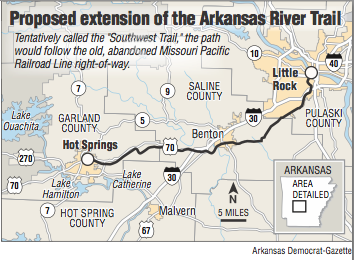Pulaski County Quorum Court will take the first vote today towards a project that would construct a hike-and-bike trail connecting Little Rock and Hot Springs.
Since 2013, Pulaski, Saline and Garland counties, along with federal and state transportation agencies, have been conceptualizing a paved 65-mile trail for bicyclists, walkers and joggers that would run from Little Rock's Central High School, through Saline County and terminate at the Hot Springs National Park.
Earlier this year the three counties were awarded a Federal Lands Access Program grant, which supplements local resources to improve transportation facilities that provide access to federal lands. The award would pay for 80 percent, or ̶$̶3̶.̶2̶ ̶m̶i̶l̶l̶i̶o̶n̶ $2.6 million of the trail project's first phase, which includes a preliminary engineering study and an environmental impact study. The three counties are required to contribute the remaining 20 percent, or $̶8̶0̶8̶,̶0̶0̶0̶ $520,000, toward the first phase, according to figures from the Arkansas Highway and Transportation Department, which administers the grant.
If Pulaski County passes its resolution Tuesday, the county would be the first entity to commit to the federal grant's contract and requirements. The exact dollar amount the county would contribute toward first-phase funding, however, is not yet determined, county officials said.
However the contract agreement would begin the early stages of a project that has until now been only an idea, one which local leaders hope will spur economic development. County Judge Jeff Arey of Saline County said he is fully behind the idea, although he does not know when the Saline County Quorum Court will consider funding for the project.
Garland County Judge Rick Davis could not be reached for comment Monday.
A study commissioned in 2015 estimated that the so-called "Southwest Trail" could have significant impact on tourism in the three counties, including 65,000 trail users spending $3 million in the region's economy each year and supporting 68 new jobs.
Early project costs are estimated at about $33.3 million, with Pulaski County contributing $11.3 million, Saline County contributing $14.4 million and Garland County contributing $7.6 million, according to the study, which was conducted by Alta Planning & Design of Bentonville.
Though a definitive route has not been determined, the direction of the trail would roughly follow that of the historic Southwest Trail, a network of trails used by Americans Indians and early pioneers to travel from St. Louis, through Little Rock and down into Texas.
According to state historian Linda Speer, director of the State Archives, 80 percent of the territory's early settlers entered the region via the Southwest Trail.
"If you weren't traveling on the waterways in Arkansas, that was the main path that you used to get from the northeast to the southwest in Arkansas," she said. "It certainly helped Arkansas to achieve statehood in 1836."
Over the decades the route of the trail shifted as towns were established, like Washington, Benton and Rockport, Speer said.
By the 1870s railroads began running along the same route as the Southwest Trail, then later U.S. 67 and Interstate 30.
"So as newer forms of transportation were introduced, the trail became obsolete," she said.
The stretch of the recreational trail passing through the unincorporated areas of Pulaski County will use sections of an old railroad right of way previously used by Missouri Pacific and Rock Island Railroad, which went bankrupt in the 1980s. The county purchased those abandoned lines roughly a decade ago, also using federal grant dollars.
The route of the trail in Saline and Garland counties is a little less certain, Richard said.
"The route will be determined by ease of construction and how much right of way is going to have to be purchased," said Pulaski County Public Works Director Barbara Richard. "That will all be presented periodically through studies that will be ongoing."
Arey plans to restore the Old Saline River Bridge -- a 120-year-old river crossing that was abandoned in the 1970s when a truck damaged its wooden-planked bottom -- using county funds and grant dollars.
The total project cost is estimated at $3 million, Arey said, and the project has so far been awarded $1.3 million in grants. Located 1 mile east of Interstate 30's Saline River crossing, the Old Saline River Bridge would span the largest waterway the Southwest Trail would need to cross.
"The trail has to cross the [Saline] River at some point somewhere, and it just seemed to me a natural fit to cross there," Arey said. "Then we could do two things -- the trail can reach the other side of the river, and we could save this bridge."
Federal grant dollars for the second phase of the project, which would pay for land and acquisition of rights of way, would not be available until 2020, according to the U.S. Department of Transportation's website.
"Anytime you have a project that big, it takes a while," said Metroplan's Deputy Director Casey Covington. The federal dollars "are a big step towards moving the project forward, but it'll take multiple years to construct the entire project."
Metro on 06/27/2017
*CORRECTION: A federal grant amount awarded to a project that would construct a hike and bike trail between Little Rock and Hot Springs was $2.6 million, and Pulaski, Saline and Garland Counties would together be contributing roughly $520,000 toward the project. A previous version of this article incorrectly stated the amounts.
